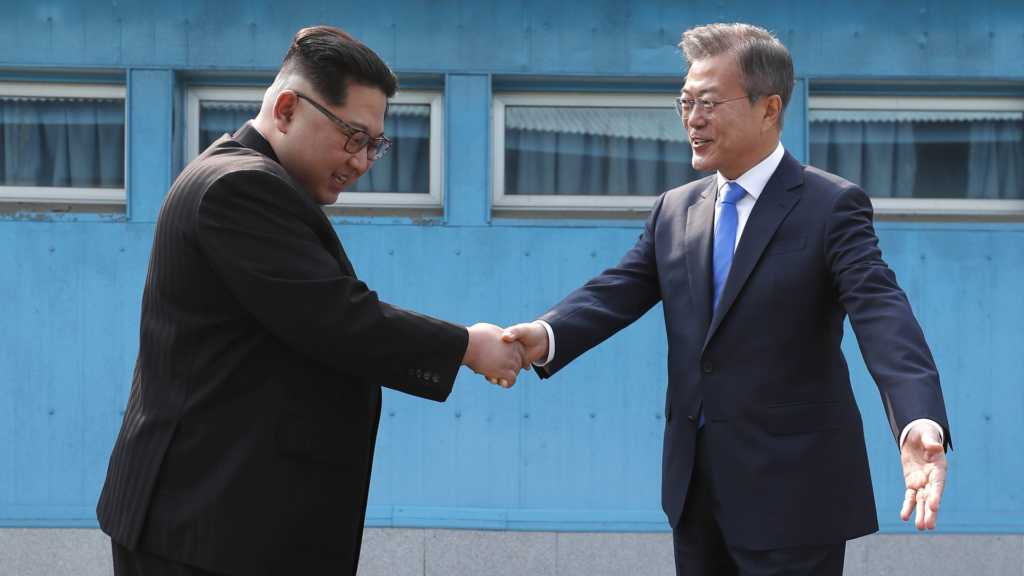After a year of tremendous and mounting tension that sparked fear of nuclear war, last week the leaders of North Korea and South Korea gathered in an historic meet-up, and pledged to pursue peace in the future.
North Korean leader Kim Jong Un and South Korean President Moon Jae met to discuss the Korean War and the shared goal of ending the division between the nations that lasted over half a century. This came as a shock to the world, Kim became the first North Korean step foot on South Korean soil since the Korean War ended in 1953, CNN reported.
The two leaders shook hands over a concrete curb marking the border between the Koreas at the truce village of Panmunjom.
https://twitter.com/Breaking911/status/989668293337378816
The leaders also agreed that both countries want to denuclearize the Korean peninsula that falls between the countries.
After a day of meetings, including a private conversation between Kim and Moon, the South Korean and North Korean leaders signed the “Panmunjom Declaration for Peace, Prosperity, and Unification on the Korean Peninsula.” The two followed their signage by promising both countries that they “will be reunited as one country.”
Kim and Moon even clasped hands and then hugged following the signing, a majorly symbolic act of unity.
The meeting signals progress, as North Korean leaders have refused to meet with South Korea for decades. But this does not mean that relations between the countries can be expected to thaw immediately. There are still complex obstacles that stand in the way of a complete peace deal.
For one, China and the United States both will need to be involved with peace talks, as both were involved with the original conflict.
“I don’t know how to say ‘charm offensive’ in Korean, but that is what we are seeing,” stated Richard Haass, president of the Council on Foreign Relations, according to Axios. “What matters, though, in the context of N-S relations is what the North is prepared to do to reduce the conventional military threat it poses to the South.”
“What matters in the context of [U.S. relations with South Korea] is whether the South hangs tough and does not offer up economic incentives that 1) reward the North for promises rather than actions and 2) ignore U.S. concerns, above all the nuclear and ballistic missile programs. Still, we are a long ways from not all that long ago, when conflict seemed all too possible and imminent.” Hass continued.
The imminent deal between the countries could signal peace for the citizens, but a key question remains: What does this mean for religious freedom in North Korea?
Suzanne Scholte, chairman of the North Korea Freedom Coalition, has called Kim’s leadership “satanic” and “cult-like,” and has warned on countless occasions that progress for the country’s foreign relations doesn’t equate to progress for human rights laws in the country.
She warned that even though Kim is expecting to have favorable negotiations with Trump, the religious freedom crisis in North Korea will not change.
North Koreans are currently only legally allowed to practice the ideology of Juche, which is the worship of the Kim family. Scholte argues that the only way to defeat Kim and his evil empire is through spiritual warfare.
“This actually came from a congressional international religious freedom caucus briefing in January where the foremost expert of Juche, which is really the religion of North Korea, said to combat the demonic principalities in North Korea, we need to not only pray, but we need to fast,” Scholte explained, according to CBN.
Scholte is calling on the United State and President Trump to be firm with their negotiations with the Kim regime.
“We should at the very least be demanding that he release the prisoners, the Americans that he’s holding, most of whom are Christians,” she said.
Scholte said that the negotiations should also demand that the regime stops torturing North Koreans who try to flee the country. She added that she cannot predict how Kim will react to the negotiations, but she fully believes “with God all things are possible.”
Brian Orme, the Content Director for Open Doors, an organization dedicated to saving persecuted Christians around the world, noted that the talks are significant, but pose no real promise for religious freedom.
Orme posed three questions upon hearing of the talks:
- What does this mean for the 300,000 Christians who are forced to keep their faith a secret?
- What will the denuclearization and peace talks do to help expedite the release of over 50,000 Christians suffering in hard labor camps because they believe in Jesus?
- Will we see more intellectual and religious freedom in the North in response to these peace talks with the South—and later with the U.S.?
Orme said that the meeting of the two leaders signals a shift, even if just a subtle one, “in North Korea’s hardline stance as a closed and militant country.” He added, however, that it would be hard for a fast shift to take place in the country, and that there was no talk of changing the free thought or the political system in North Korea.
Brother Andrew, the founder of Open Doors, once said, “If we would understand the potential power of our prayers, we would be on our knees a hundred times a day and ask Him things that would turn the world upside down.”
Orme calls on others around the world to pray for those persecuted in North Korea.
“Our prayers should be as bold as to ask for total religious freedom—and the rapid growth of the church in North Korea,” he said.
Continue to pray for our brothers and sisters in Christ who are facing persecution day after day.



